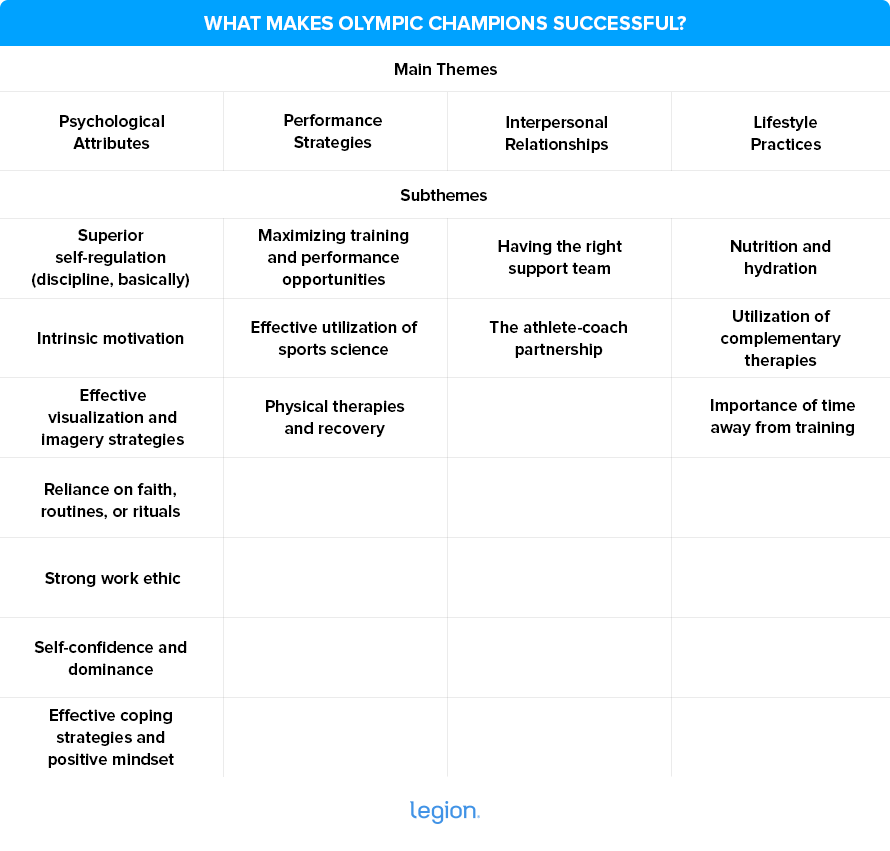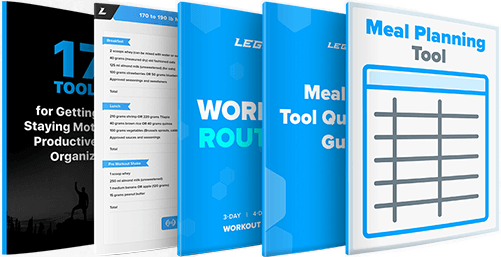
Ask anyone what it takes to become a regional, world, or Olympic champion, and they’ll probably say something like “talent,” “dedication,” and “luck.”
While these answers are hard to argue with, they aren’t very specific or actionable. What talents were most helpful in driving their success? What were they dedicated to? How did luck manifest itself?
In other words, what was it that made these people talented, dedicated, and lucky?
Part of the answer lies in the daily routines, habits, and processes employed by high level athletes and people in their immediate circles.
Athletes must be able to balance the demands of competition, the normal stresses of daily life, and navigate relationships with family, peers, coaching, and support staff, yet still stay focussed and perform at a high level when it counts.
They must cultivate daily routines that involve everything they need to perform well, like adequate rest, good nutrition, physical therapies, and more.
Understanding how to achieve and sustain podium-level performance has possessed scientists, athletes, and coaches for decades, and there’s an abundant body of evidence that helps us connect the dots.
One such study was conducted by scientists at RMIT University, who wanted to explore the role of lifestyle choices and mindset on athletic success.
Let’s look at what they did.
What Did the Researchers Do?
Most of the studies you’ll find mentioned on health and fitness blogs (including this one) is quantitative—it expresses data in numbers, ratios, percentage changes, and so on.
For example, most studies on elite athletes try to quantify the importance of honing physical and sport-specific skills, such as developing explosive speed out of the blocks if you’re a sprinter, building muscle mass if you’re an Olympic weightlifter, or burnishing your aerobic capacity if you’re a triathlete.
The study in question goes down the path less traveled by looking at qualitative data.
Qualitative data refers to non-numerical data, such as answers given in interviews, first-hand observations of an event, and questionnaires, and can be used to study a person’s perception of reality.
Instead of asking how well did the athlete perform, the researchers wanted to know how well did the athletes think they performed, and why?
In this case, the researchers explored the role that lifestyle and mindset play in athletic success.
To gather their data, the researchers conducted one-on-one semistructured (conversational) interviews with 10 male and female world, Olympic, and Paralympic gold medal winning athletes.
To ensure the format of each interview was consistent, the researchers developed an interview guide that included a broad line of questioning on the sporting background, athletic profile, lifestyle practices, support networks and key support services, and habits relating to life balance, rest, and recovery of each athlete.
Examples of questions taken from the guide include:
- Tell me about how you got involved in your sport.
- What’s the highest level of competition you have achieved?
- To what (factors/attributes) do you attribute your success?
- What planning or preparation did you do leading up to a major event?
- Did you have any “extra-curricular” training activities you implemented that were separate to the set team training program?
- Can you describe your daily diet during a pre-competition and competition day?
- Do you have someone in your life who makes you laugh?
- Who provided you with support during the hard times of your sporting career?
- What did you do to relax when you weren’t training or competing?
- Did you have any specific treats, rituals, or rewards?
The answers given were recorded, then transcribed verbatim, before the researchers used specific qualitative software to organize the responses into themes.
The researchers also used a three-step process to analyze their findings even further:
- The main researcher used a journal to record notes, observations, reflections, potential themes, and questions that could be used with subsequent interviewees.
- Regular meetings between researchers were held to discuss and confirm emergent themes and subthemes.
- Quotations from the participants were applied to illustrate and support each emergent theme and subtheme.
What Were the Study Results?
The researchers identified four key themes, each with a set of subthemes, that the athletes singled out as critical to their success.
These themes and subthemes are shown in the table below:

We don’t need to go through all of the quotes recorded by the researchers, but here are a few highlights I winnowed from their findings (along with their associated theme):
Superior self-regulation
“There are three things that I attribute to my success. Vision, a real clear sense of what I want. Courage, to keep getting up and fighting, courage to surround myself with the right people and put my hand up and ask for help; and resilience to keep getting up, because I failed a lot more than I succeeded.”
Effective visualization & imagery strategies
“I visualised myself from a judge’s perspective, from a helicopter angle and, in my own eyes, what I see. It takes a lot of skill to be able to do that and get it to play the right images and not negative ones or crashing. When I sat in the wheelchair (due to injury), that’s all I did, visualize, even my body healing. I used to visualise myself at the gym and doing everything that I couldn’t do . . . it’s just training smarter.”
Reliance on faith, routines or rituals
“I think it’s more important to believe in yourself than to believe in something else. Maybe by believing in something else that helps somebody believe in themselves more, fantastic if that’s the way they want to be, but I just learned to believe in myself.”
Self-confidence and dominance
When asked, How mentally strong did you feel on the day of competition? one athlete responded: “Unbeatable, most of the time.”
Another athlete was asked if she studied her opponents: “I didn’t study anybody. I figured they were studying me. I never ever wasted the time in thinking about anybody else, ever.”
Effective coping strategies and positive mindset
One athlete describes her response after a career-changing knee injury: “Instead of just going, ‘Well, just wait and see what happens’ I put a plan together. I put dates on it, then when I couldn’t do one thing, I’d miss it and go to the next one. Because it was written on a ball, it was in front of me every single day, it was a reminder; ‘This is what I’m going for.’ It wasn’t something that was deep in the back of my mind, it kept me accountable to do the work, to do the rehab, to keep trying, pushing to the next step. Then other people saw it and we talked about it. They’d come into the house and see the ball and we’d chat about it. So that was good, by having the goal out there, it helped people support me.”
Effective utilization of sports science
One athlete talked about using a breathing technique they learned from a sports scientist: “You really concentrate on hearing yourself exhale and just by doing that it distracts your mind from the pressure of the competition. When you’re under extreme pressure you tend to think negative thoughts, when you’re concentrating on your breathing it just puts this little man in your head to sleep because he’s got nothing to do. If he’s concentrating and listening to your breathing, he’s not telling you you’re about to miss the next target and you’re not going to win the Olympic final.”
Nutrition and hydration
“As a general rule, I would make sure my plate was colourful. A combination of good carbs with protein and fat. I ate more fat than what a lot of the other athletes were eating. Like seeds and nuts. I kind of disagreed with the high-carb thing, refined carbohydrates from pastas and rice. I want to sustain energy, so that’s what I tried to do with diet. Listening to my body.”
Utilization of complementary therapies
One athlete talked about how diet had at one time held him back: “I realised that my behaviors were as inconsistent as my mindset. I’d be bitching about my weight and then I’d reward myself for a workout with apple pie or cheesecake. I didn’t have enough discipline.”
Importance of time out
One athlete described how she would relax: “Movies and get into bed . . . You’re watching a movie—it’s escapism, you’re lying down, you’re warm, you actually feel safe, not dying right now. You’re not going to kill yourself going off a jump at 70K an hour.”
What Does This Mean for You?
This study isn’t just an interesting peek behind the curtain of the highest level of professional sport—the athletes’ answers contain a great deal of wisdom that can be used by anyone looking to excel in any field that requires skill, grit, and patience.
What’s more, much of what they say is directly applicable to people looking to get strong, build muscle and lose fat.
Let’s take a look at each more closely.
Psychological Attributes
All of the participants were meticulous when it came to planning and preparation in all aspects of their lives, and while few of us will need to be as regimented as a world, Olympic, or Paralympic athlete, planning ahead is a great way to ensure you achieve your health and fitness goals.
Choosing a workout split that fits with your schedule is a great way to start, and means you’ll always know what exercises you’re going to do every time you step foot in the gym. Likewise, planning and prepping your meals takes all the guesswork out of your eating, and guarantees you hit your calorie and macro targets every day.
Developing routines can also help in this regard, and was yet another subtheme that many of the athletes mentioned. This might mean finding the best time of day for your gym sessions and working it into your daily schedule so that it’s easier to stick to, or developing a solid sleep hygiene routine that ensures you get adequate rest each night.
Many of the athletes talked about finding intrinsic reasons to train. This means they found ways of loving the process of training, rather than doing it because succeeding would earn them money, fame, or opportunity.
Unfortunately, many of us exercise for extrinsic reasons, like:
- Wanting to be more attractive to potential partners
- Wanting to feel more comfortable in your own body
- Wanting to fit in a certain piece of clothing
- Wanting to look better in family pictures
- Wanting to reduce cholesterol, blood pressure, or another health marker
- Wanting to complete some kind of athletic event
These are all legitimate reasons to start working out, and they can give you the momentum you need to tough out the first leg of your fitness journey.
The problem, though, is this kind of motivation soon loses its luster.
Follow the gold medalists’ lead, and learn how to fall in love with exercising and eating healthy. The secret to making this work largely boils down to finding a training program that involves exercises you enjoy, doing cardio workouts you find fun, and following a diet that’s flexible and that allows you to eat foods you like.
It can also help to start small and introduce these healthy habits incrementally. Little wins—such as preparing a day’s worth of nutritious meals ahead of time or completing a couple of home workouts in a week—will give you a taste of success.
These successes will compound over time, increase the enjoyment factor, and give you the motivation and confidence to make healthy eating and exercise part of your daily routine.
The researchers also noticed that a consistent theme among all of the athletes was their willingness to seek out and employ expert advice.
While you may not have A1 coaches to call on when you need help, you can find a treasure trove of advice, motivation, and effective diet and exercise plans in books, blogs, and podcasts. A good place to start would be reading Bigger Leaner Stronger (for men) or Thinner Leaner Stronger (for women), reading the Legion blog, and listening to the Muscle for Life podcast. And if you really want to knuckle down, you can also hire a Legion coach to give you personalized assistance, on par with what many of the athletes in this study enjoyed.
Performance Strategies
All of the athletes in this study described wanting to get the most out of each and every one of their training sessions.
No one—including champion athletes—wants to train every day, and everyone will experience an “off day” from time to time.
There’ll be days when you didn’t get enough sleep the night before, days when you didn’t eat anything before your workout, and days when going to the gym is the last thing you want to do for a million other reasons. In other words, you’ll have some shitty workouts.
These days aside, though, how often do you go to the gym wanting to get the most out of your workout, and how often do you just go through the motions?
How often do you go into a workout focused on executing each and every rep as well as you possibly can, and how often do you view your hour in the gym as a time to chew the fat with your workout buddies, scroll through social media, or simply switch off your brain after a long day at the office?
If we’re honest with ourselves, our time in the gym probably isn’t always as focused as it should be. Luckily, the things that sap our focus during workouts are often easily remedied.
Workout with friends who are more interested in goofing off than making progress? It might be time to find a new workout partner who shares similar goals to you.
Spend too much time on social media between sets? Leave your phone in your locker or switch to airplane mode while you’re in the gym.
Find it hard to focus after a day of work? Find a pre-workout that contains ingredients proven to sharpen your mental focus, and improve your mood and energy levels.
Most of all, change your mindset—view each workout as a stepping stone on the path to mastery, not just of the weights, but of your own behavior.
Interpersonal Relationships
Every athlete mentioned a significant person in their life who was influential and supportive in their career.
For some this was a parent or partner, while for others it was a teammate, coach, or someone in their support team (a physiotherapist or masseur, for example).
These people were highly valued because they helped the athletes unwind, relax, and unplug from the pressures of training and competition.
While not all of us will feel our health and fitness journey is as all-encompassing as training for Olympic gold, it’s not uncommon to place too high an emphasis on fitness-related goals such as losing weight or building muscle, often at the expense of our relationships with partners, friends, and family.
For example, have you ever turned down the opportunity to eat out with your friends because you’re afraid the restaurant food will be too high-calorie for your diet? Or have you ever said no to taking a trip with your partner because it would make sticking to your normal training routine impossible?
If the answer to either of these questions is yes, it might be time to listen to the athletes in this study. For them, taking time away from their sport to spend time with people they care about was one of the keys to their success. They gave their best when they were training, but the only way they could maintain this intensity was by occasionally resting on their oars.
So, the takeaway here is simple: Spend time with people you care about, even if you’re busy. It bolsters your resolve, nourishes your mental health, helps break up the monotony of fitness with a bit of joie de vivre.
Lifestyle Practices
It should come as no surprise that the athletes in this study placed a premium on eating a healthy, nutritious diet. Also unsurprisingly, many found practices such as yoga, meditation, acupuncture, and kinesiology to be beneficial.
What might not be quite so obvious, though, is the importance they placed on taking time out from sport.
Despite their monomania for sports, all of the athletes had their own way of “escaping” the rigors of training, travel, and competition, normally with activities like taking a bath, shopping, catching up with friends, interacting with nature, watching movies, reading, or listening to music.
If you’re serious about fitness, thoughts about eating and working out can indwell your mind for much of the day. Whether you’re meal prepping, counting calories and macros, lifting weights, doing cardio workouts, listening to podcasts, or reading books and articles, it all takes time, energy, and attention.
In much the same way that a diet break or deload week can help you stick to your diet or workout program, disconnecting from fitness-related activities to occasionally chase other brass rings and enjoy other hobbies can help you get and stay in great shape. Although it might feel like a momentary step backward in the moment, it sets you up for many steps forward.
+ Scientific References
- Corazza, O., Simonato, P., Demetrovics, Z., Mooney, R., van de Ven, K., Roman-Urrestarazu, A., Rácmolnár, L., De Luca, I., Cinosi, E., Santacroce, R., Marini, M., Wellsted, D., Sullivan, K., Bersani, G., & Martinotti, G. (2019). The emergence of Exercise Addiction, Body Dysmorphic Disorder, and other image-related psychopathological correlates in fitness settings: A cross sectional study. PLoS ONE, 14(4), e0213060. https://doi.org/10.1371/journal.pone.0213060
- Back, J., Josefsson, T., Ivarsson, A., & Gustafsson, H. (2019). Psychological risk factors for exercise dependence. International Journal of Sport and Exercise Psychology. https://doi.org/10.1080/1612197X.2019.1674902
- Burns, L., Weissensteiner, J. R., & Cohen, M. (2019). Lifestyles and mindsets of Olympic, Paralympic and world champions: Is an integrated approach the key to elite performance? British Journal of Sports Medicine, 53(13), 818–824. https://doi.org/10.1136/bjsports-2018-099217
If you enjoyed this article, get weekly updates. It’s free.
Sending…
Great! You’re subscribed.
100% Privacy. We don’t rent or share our email lists.






